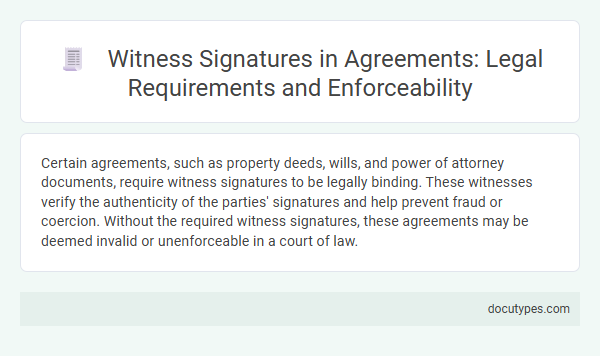Certain agreements, such as property deeds, wills, and power of attorney documents, require witness signatures to be legally binding. These witnesses verify the authenticity of the parties' signatures and help prevent fraud or coercion. Without the required witness signatures, these agreements may be deemed invalid or unenforceable in a court of law.
Introduction to Witness Signatures in Agreements
Witness signatures serve as a verification method to confirm the authenticity of parties involved in an agreement. This ensures that the document was signed willingly and without coercion.
Certain agreements, such as wills, powers of attorney, and property deeds, often require witness signatures to be legally binding. Witnesses provide an additional layer of security, enhancing the agreement's enforceability in legal situations.
Legal Definition of a Witness Signature
| Agreement Type | Witness Signature Requirement | Legal Definition of a Witness Signature |
|---|---|---|
| Last Will and Testament | Required for validity in most jurisdictions | A witness signature confirms that the testator signed the will voluntarily and was of sound mind during execution. |
| Deeds and Property Transfer Documents | Often required to ensure authenticity | A witness signature verifies the identity of the signatory and attests to the signing act to prevent fraud. |
| Power of Attorney | Frequently requires one or more witness signatures | The witness signature validates that the principal signed the document willingly and understands its implications. |
| Contracts Involving Personal Services (e.g., Marriage Settlement Agreements) | May require witness signatures depending on local law | A witness attests to the genuine consent and presence of parties during signing. |
| Confidentiality Agreements and General Contracts | Typically do not require witness signatures | Witness signatures are optional and serve as additional proof of agreement execution. |
Purpose of Witnessing in Legal Agreements
Witness signatures play a crucial role in certain legal agreements by verifying the authenticity of the parties involved and preventing fraud. The purpose of witnessing is to provide an impartial confirmation that the signatures are genuine and the parties understood the document's content.
- Wills and Testaments - Require witness signatures to confirm the testator's intent and mental capacity at the time of signing.
- Power of Attorney - Often need witnesses to ensure the principal voluntarily grants authority without coercion.
- Real Estate Contracts - Witness signatures help validate the authenticity of the agreement and protect the parties from disputes.
Agreements Requiring Witness Signatures
Agreements requiring witness signatures typically include wills, powers of attorney, and certain property transfer documents. Witness signatures help verify the authenticity of the parties involved and prevent fraud or undue influence. Legal requirements for witness signatures vary by jurisdiction, making it essential to understand local laws for enforceability.
Qualifications of a Valid Witness
Which agreement requires witness signatures to be legally binding?
Agreements such as wills, powers of attorney, and certain property deeds often mandate witness signatures to ensure validity. A valid witness must be an impartial adult, mentally sound, and preferably not a party to the agreement to avoid conflicts of interest.
Common Legal Requirements for Witness Signatures
Certain agreements require witness signatures to be legally binding, such as wills, powers of attorney, and property deeds. Common legal requirements for witness signatures include the witness being an impartial adult, signing in the presence of the parties involved, and providing their full name and address. To ensure Your agreement is enforceable, verify if witness signatures are mandated by the jurisdiction governing the contract.
Consequences of Invalid or Missing Witness Signatures
Certain agreements, such as wills, powers of attorney, and property transfer documents, require witness signatures to be legally binding. These signatures verify the authenticity of the parties involved and prevent fraud.
Missing or invalid witness signatures can render an agreement unenforceable or void in court. This may lead to legal disputes, delays in execution, and potential financial losses for the parties involved.
Enforceability of Agreements Without Witness Signatures
Not all agreements require witness signatures to be legally binding. The necessity of witness signatures depends on the type of agreement and applicable jurisdictional laws.
Agreements such as wills, powers of attorney, and certain real estate contracts often mandate witness signatures for enforceability. However, many contracts, including service agreements and sales contracts, remain enforceable without witness signatures if they meet essential elements like offer, acceptance, and consideration. Courts may uphold an unsigned agreement's validity based on evidence demonstrating both parties' intent to be bound.
Electronic Signatures and Digital Witnessing
Agreements requiring witness signatures to be legally binding vary by jurisdiction and document type. Electronic signatures and digital witnessing are increasingly accepted methods to fulfill these requirements in modern contracts.
- Wills and Testaments - Often require witness signatures to validate the document and ensure it was signed voluntarily.
- Power of Attorney Documents - Typically need witnesses to confirm the identity and intent of the signer.
- Property Transfer Agreements - May mandate witness signatures to prevent fraud and establish authenticity.
Your use of electronic signatures combined with digital witnessing technology can satisfy legal standards for such agreements in many regions.
Which Agreement Requires Witness Signatures to Be Legally Binding? Infographic

